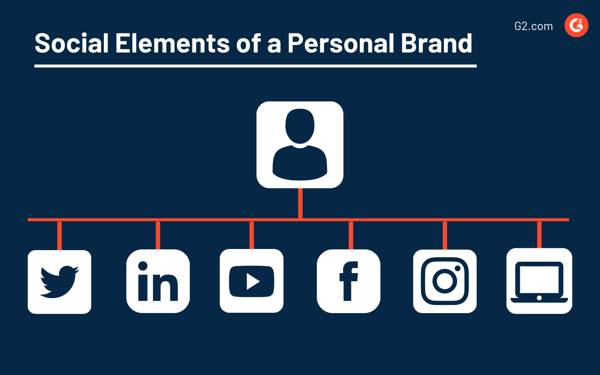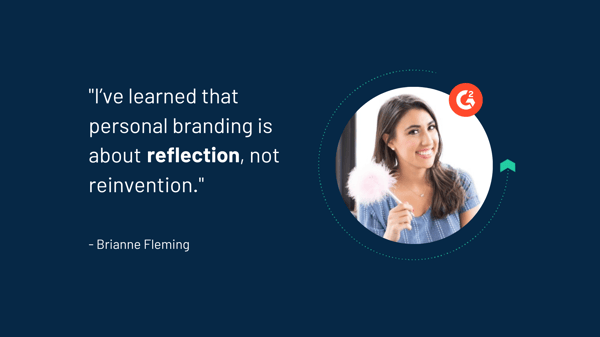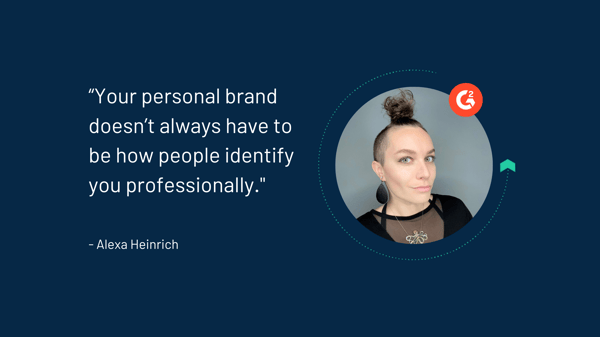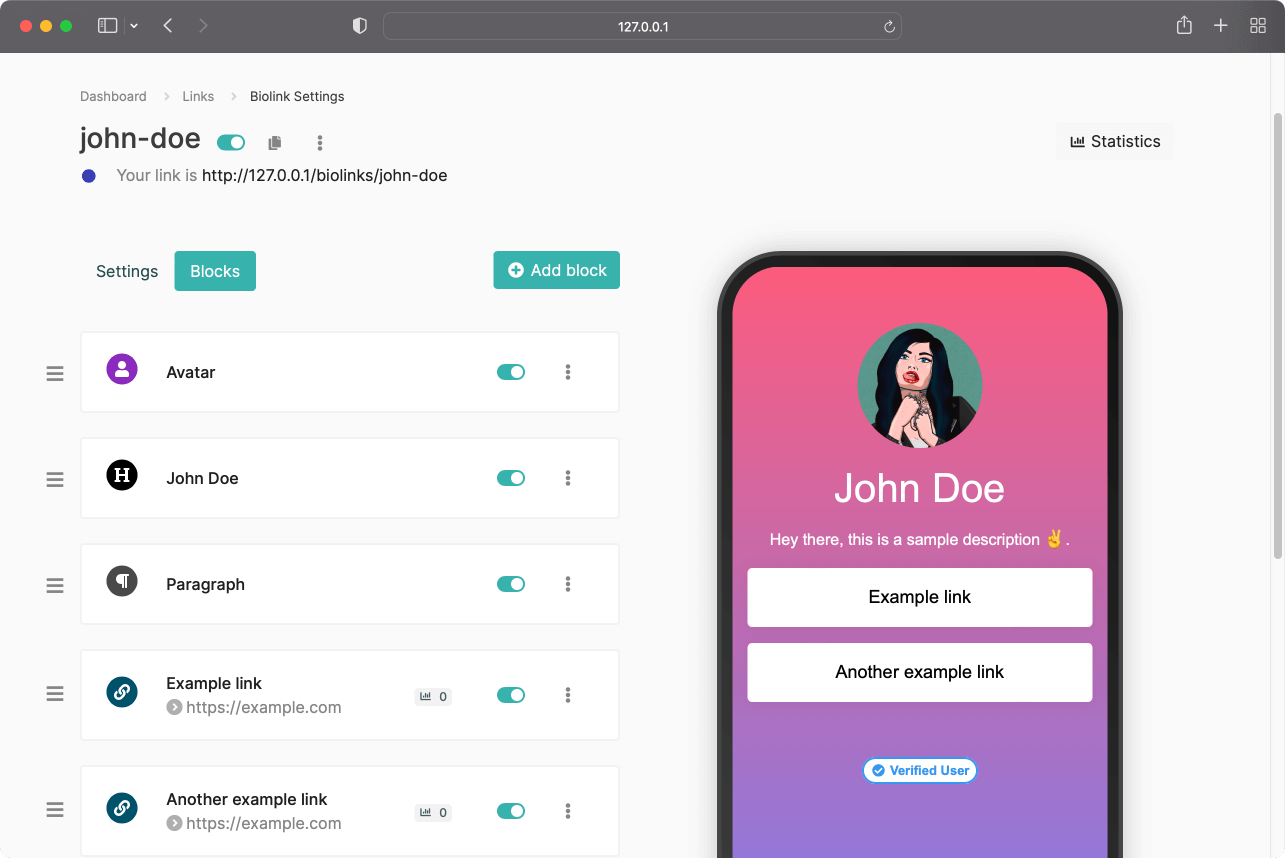It’s always a great time to work on yourself.
And I don’t mean working on your fitness routine or giving yourself a new hairstyle. I’m talking about putting in the work to cultivate a personal brand you’re proud of.
What is a personal brand?
A personal brand is how you choose to promote yourself. It’s how you want to share your skills, personality, and experience with the world. A personal brand is about visibility and the values that you outwardly represent in the hopes of influencing public perception and making an impact.
There are many purposes to having a personal brand, one being to further your career by positioning yourself as an expert within a specific industry. By building a personal brand, you can grow your social media following, sell more products or services, and open the door to career opportunities. Plus, you can use website builder software to make your personal website stand out from the crowd.
It’s important to know that building a strong personal brand doesn’t happen overnight. But it’s important that you remain committed to creating one.
Why is having a personal brand important?
Having a unique brand can be important for you both personally and professionally. Because your brand is how you present yourself to current and potential clients, you can ensure they see you the way you want them to, instead of crossing your fingers and hoping for the best.
You can highlight your strengths, passions, and weaknesses so people get to know the real you – even if they’ve never met you in person. In addition to helping you stand out, there are many benefits to having your own personal brand. Below are some reasons why creating one is something you should consider.
Establish trust and authority
When people feel like they know you and understand your values, they are likely to trust you. A personal brand can lead to more career advancements and business opportunities. It’s also how you can show you have authority in a particular space or industry.
Build a network
A personal brand should clearly articulate who you are, what you do, and how you can help others. This makes it easy for those in a similar space to see value in connecting with you. Having effective branding to leverage and help you build your network, both off and online, can go a long way.
Attract more clients
You will attract more people in your target market when you build a successful personal brand that you’re not only proud of, but that positions you as the go-to expert in a specific niche, field, or industry. Then, these people will hopefully become your ideal clients. And when you’re the expert, these clients will likely refer you to new customers, too.
Own your story
If you don’t invest the time and energy (and sometimes money!) into creating an online brand for yourself, you leave yourself vulnerable to others making assumptions about you on their own. Define your brand and what makes you unique so that you can influence how people perceive you and what you stand for – instead of someone else doing it for you.
Get featured in media
If you struggle to pitch your business or ideas to online publications or podcasts, having a personal brand can simplify this. There are specific media outlets that are always searching for the next big thing, thought leader, or specialized expert, and a strong brand and online presence makes it easy for outlets to find you so you can share insights with their audience.
How to build a personal brand
When building a personal branding strategy from the ground up, there are specific tactics you should follow throughout the process. While ultimately, how you create your brand will be unique to you and what you have to offer, you can still follow some basic steps along the way.
1. Start with a solid foundation
The first step to creating a strong personal brand is to lay a solid foundation that you can build on as time goes on. It’s important to stay true to your authentic self. Instead of creating a fake persona as a facade, the foundation of your personal brand should be a true reflection of who you are.
Branding isn’t about positioning yourself as someone or something you’re not, but showcasing what makes you unique to your audience and potential customers.
To get started here, take inventory of the foundational elements you already have. This includes things like:
- Skills and credentials: What talents have you acquired throughout your life? What are some awards you’ve received or training you’ve done?
- Passions and interests: What industries and topics are you most interested in? What are you passionate about?
- Values and beliefs: What do you believe in and stand for? In contrast, what do you stand against?
Next, dive headfirst into identifying the details of your brand. This includes narrowing down your brand vision, writing a personal brand statement, cultivating a mission, and developing a unique personality.
Another step in building a foundation is auditing your search results. Before you get too far in the personal brand process, know where you stand in Google and other search engine’s eyes.
To do this, simply take a deep breath and Google yourself. Don’t worry about what you find when looking through search results that may damage your reputation. Take time to delete or unpublish old posts that no longer align with your vision.
Not sure what needs to be deleted? The most damaging content includes:
- Unprofessional behavior or communication styles
- Photos and posts hinting at excessive drinking, drug use, or criminal behavior
- Polarizing views related to race, religion, politics, or gender
- Content that is sexually explicit
- Violence, bullying, or bigoted behavior
While an old photo of you in your high school musical may seem embarrassing, it’s fine to leave up. However, an old photo of you drinking underage should be deleted.
The last step in building a foundation is claiming your space. This means knowing where you’d like to have an online presence. In addition to a personal website, consider having 6-10 professional profiles.

When deciding which social elements to build for your personal brand foundation, consider the following:
- A personal website
- YouTube
- TikTok
- Vimeo
- Snapchat
When making social media profiles from scratch, or updating ones you already have, use your full name when possible and fill out all necessary fields. And, if you feel comfortable, include your location on social media platforms that display it.
2. Choose a target audience or area of expertise
Something you cannot forget when building a personal brand is that you won’t appeal to everyone. Try as you might, not everyone is your ideal client. The goal should be to attract your perfect clients by identifying a specific target audience and building your brand based on what they want.
Consider outlining your ideal client profile (ICP). To do this, ask yourself questions like:
- Demographics: What is their average age, gender, profession, relationship status, education, and income?
- Pain points and challenges: What are they currently struggling with? Is something holding them back from reaching their goals or their fullest potential?
- Desires and aspirations: What are their hopes, dreams, goals, and aspirations?
The more you know about who your ideal customer is, and who they are not, the better your odds of attracting them. Then, you can choose an area of expertise to dive into based on what you believe your target audience needs.
3. Create an interesting offer
Now that you know who you want to attract with your personal brand, you can entice them with an exciting and unique offer. What you’re selling should help your audience solve a problem or achieve a specific result.
To go about this, show your customers that you’re a specialist in your field – not a generalist. You can offer clients a specific outcome with a specialized offer based on what they’re looking to achieve. Customers can spot a generic offer and a vague promise from a mile away.
Take the time to consider what you love doing, what you’re best at, and what your audience wants most – that’s what you need to offer them.
4. Build a personal brand website
Once you have your offer nailed down, how and where do you showcase it? The answer is on your own brand website.
Your website is a platform that you have complete control of. Plus, it’s often the first impression that your target audience has of your brand. Your website should tell your audience who you are and how you can help them.
Your personal brand website should be optimized with these specific elements directly on the homepage:
- A professional logo
- Your value proposition
- Several professional photos of you
- Social proof and testimonials
- A clear call-to-action (CTA)
Once the homepage is complete, don’t forget to add an ‘about me’ page, a products or services page, and a contact page.
5. Remember that content is king
Now that the core elements of your website are complete, you need to create content. Having a robust content strategy with free resources is a great way to build your brand and earn the trust of your target audience. The content you create should help your customers by positioning you as an expert within your industry.
Not sure what type of content to create? Consider common content types like:
- Articles and blogs
- Videos
- Webinars
- Podcasts
- Infographics
- Case studies
- Customer stories
- Worksheets and checklists
In addition to running your own blog, keep an eye out for guest blogging opportunities. Writing guest posts on aligned websites can boost your brand, too.
6. Establish a community
Another way to define a strong personal brand is by becoming a community leader in your specified niche or area of expertise. When you build a community of like-minded individuals, you’ll create a place where you can interact with one another, share ideas, have exciting conversations, and support one another.
Building a community doesn’t happen overnight, but it’s still essential that you put in the time and effort.
Here are a few ways to establish your community:
- Use social media to follow others in your industry and engage with them often
- Take part in live events like workshops, retreats, and conferences
- Join Twitter Chats and Facebook Groups where your audience already is and participate in conversation
Personal brand examples
Need some personal brand inspiration? Check out the following ten examples of real people with exceptional personal brands.
1. Brianne Fleming
One of the first people that comes to mind when I think of a strong personal brand is Brianne Fleming. Her brand focuses on marketing lessons with a pop culture twist. Brianne has it all: a weekly Twitter chat called #PopChat, a blog, and a podcast called ”Making the Brand’.
She also owns a marketing consultancy called Twelve Stories Up and teaches social media and branding at the University of Florida.
You can find more examples of her stand-out brand on her website.
Here’s what Brianne had to say about building a personal brand: “It can be tempting to create a whole new version of yourself for the online world, but instead, reflect on who you already are and what you’ve always loved. That’s why I unapologetically share my life-long love of boy bands!”

2. Jess Zafarris
Some people have a way with words, and Jess Zafarris is one of them. Her book, Once Upon a Word, is a dictionary for kids and helps them better understand the history and meaning of English words. The book improves childrens’ vocabulary and spelling, and teaches them to play with language.
She also has her own blog called Useless Etymology and a TikTok channel about etymology (@jesszafarris). Jess is currently the Director of Audience Engagement at Adweek.
Here’s what Jess had to say about building her brand:
“Building my personal brand has purely been an exercise in sharing the things I’m most passionate about. My work at Adweek, which focuses on building communities and connecting with the marketing community, is all about sharing everything exciting about creativity, journalism, and innovative thinking. Meanwhile, I’ve been insatiably curious about etymology my entire life, and simply sharing that knowledge on social media, on my blog, and now in book form has allowed me to unlock the wonder of words for other people too.”
“Never stop being curious, dig deep in the things that ignite your passion the most, then craft your brand around those interests. It makes it easier to maintain a cohesive identity and area of expertise if you never stop loving it.”
Jess Zafarris
3. Kushaan Shah
Anyone in the tech space knows Kushaan Shah. He’s a growth marketer and writer in the Bay Area currently working at Grammarly. For Kushaan, his personal brand spans from being an authority in marketing to simple things like personality, hobbies, interests, and his love for Taco Bell and a bad pun.
In addition to being a blogger, he also sends out the Mind Meld newsletter, which unpacks marketing and human behavior one strange question at a time.
Regarding his personal brand, Kushaan shared:
“The main advice I’d give to anyone trying to cultivate a brand: Be consistent.”
Kushaan Shah
He went on to share, “You’ll be known for something more if you just keep showing up and tweeting, writing, and talking about it repeatedly. And get over the desire to be normal. If being normal means hiding or beating down things that are interesting or unique about you in order to appear normal, it’ll be much harder to build a brand that feels emotionally comfortable. Normal is an illusion at best.”
4. Adrienne Sheares
A true expert in the world of self-branding is Adrienne Sheares. She’s an award-winning social media marketer and owner of ViviMae Labs, a strategic, data-driven social marketing consultancy.
In addition to her tweets about Orangetheory Fitness, her freelance journey, and what it means to be an entrepreneur, you can find her words in publications like Adweek, Cision, Ragan’s PR Daily, and MuckRack.
5. Christine Gritmon
Another branding expert is Christine Gritmon. She’s the host of the #ChatAboutBrand Twitter chat that happens every Tuesday and provides services like personal brand strategy and social media training for professionals looking to level up. She offers consulting, VIP Day intensives, group training, and speaking engagements.
While some people may think of a certain blonde pop star when they think of the color red, I think of Christine.
About her brand, Christine said:
“People worry about seeming fake if they’re thinking of themselves as a ‘personal brand’, but it’s what you make of it. If you’re inventing some fake persona, then yes, it will be fake. But if you’re just taking your actual self and amplifying the things that make you your you-est you, it’ll be genuine. It will resonate with the right people in a deeper way, and, above all, it will be easier for you to portray and maintain, because it’s not an act – it’s just YOU.”
“I guarantee that being YOU is more than enough for the right people.”
Christine Gritmon
6. Jeeves Williams
Next up is Jeeves Williams, whose personal brand focuses on being a freelance designer, writer, and marketer. On Twitter, he fills the typography and spaces with various comments and opinions, while also coming out with his own newsletter called, The Design Hatch.
7. Vincenzo Landino
Next is Vincenzo Landino, whose Twitter bio reads, “The F1 Guy” | F1 business, culture, and lifestyle”, which is his brand personified. Vincenzo has it all: merch, a free newsletter, an impressive TikTok following, and premium UGC creation.
Vincenzo embodies the idea of focusing on one specific niche and making it a brand.
Regarding his brand, Vincenzo said:
“To me, a personal brand is simply an extension of who you are. It’s your reputation. A personal brand shouldn’t be something you make up or feel you have to make up. Who you are as a human, offline or online, is what your brand will be known for. ”
“Having a personal brand doesn’t have to be a negative thing either, as many feel it is an overused term, or ‘cringy’. Quite the contrary.”
Vincenzo Landino
8. Alexa Heinrich
Someone who continuously makes strides in ensuring social media is accessible to everyone is Alexa Heinrich. She is a social media strategist and professional speaker who specializes in accessibility and is the founder of Accessible Social, which educates others about accessible best practices for social media content.
And in September 2020, Alexa was the winner of the Sprout Social “Always On” Award.
Alexa shared her thoughts on personal brand and said:

She continued, “Outside of accessibility and social media marketing, my personal brand also includes being obsessed with octopus, press-on nails, and playing The Sims. Your personal brand is what you make it!”
9. Mindy Thomas
Another expert in personal branding is Mindy Thomas. On her blog, podcast, and social media channels, Mindy openly shares how six months into the pandemic, she discovered that her high-demand 9-5 role was no longer sustainable. She put both her family and mental health first and walked away from a secure paycheck with no backup plan.
You can learn more about her transition to being a full-time content creator on her blog.
About her personal brand, Mindy shared:
“The moment I stopped trying to be what I thought my audience wanted was the moment my personal brand started working FOR me, instead of me working to establish it”
Mindy Thomas
She continued, “Yes, it takes thought and intention, but it also just means genuinely sharing your knowledge, supporting others when they provide theirs, and ultimately breaking the social barrier and letting people get to know who you actually are. Not just who you think they want to see. That’s when the real magic happens!”
10. Jason Bradwell
Last but certainly not least is Jason Bradwell, who helps B2B companies do better marketing. He runs a blog, has his own podcast, and even has a weekly newsletter centered around B2B marketing that features tips, frameworks, and case studies.
Regarding his personal brand, Jason shared:
“Personal branding is an intentional act of telling your story to serve others. It’s taking the elements of what makes you unique – a perspective, a personality, a purpose – and crafting it into a narrative helping others become a better version of themselves. ”
Jason Bradwell
He continued, “For me, this means sharing my knowledge on how early-stage B2B companies can do marketing that is better than boring, because I truly believe it’s one of the best competitive advantages available to businesses.”
Source : https://learn.g2.com/personal-brand



























No Comments